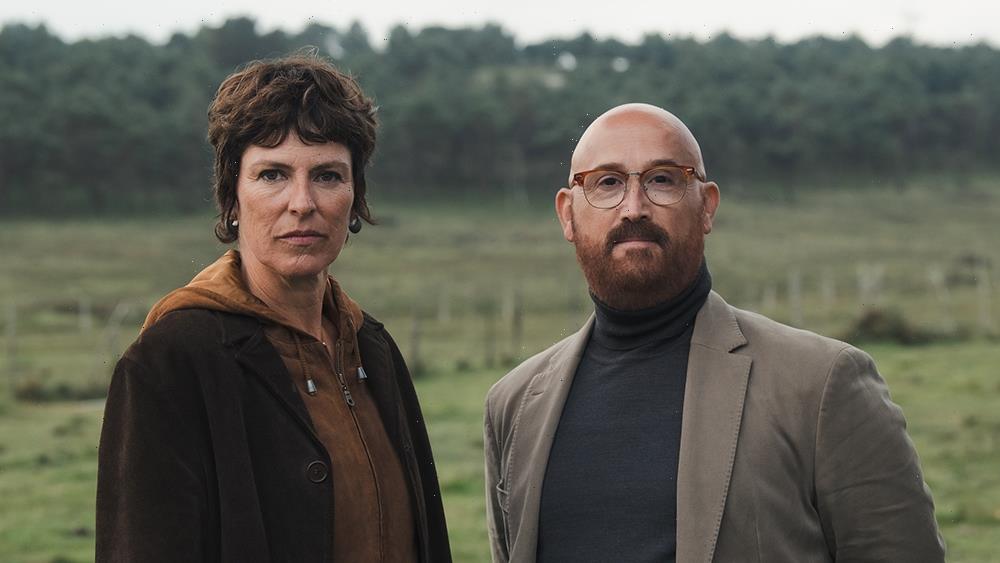An eerily quaint and picturesque Galician town sets the scene for a chilling high-profile murder in “Rapa,” the highly anticipated follow-up to Spain’s Movistar Plus hit “Hierro.”
After coming to the aid of bloodied Mayor Amparo Seoane (Mabel Rivera), lone witness and stymied professor Tomás (Javier Cámara, star of Almodóvar’s “Talk to Her”) becomes obsessed with her murder case and forms an unlikely bond with unyielding Civil Guard Sargent, Maite (Mónica López, “Hierro”). As word of the crime shakes the town, a community’s secrets rise to the surface.
Produced by Movistar Plus in conjunction with Portocabo, led by Alfonso Blanco, and expertly directed by Jorge Coira, the six-part series offers up complex and riveting plot twists as questions arise regarding the salient nature between victim and perpetrator.
The drama, distributed by Beta Film, reunites creators Pepe Coira and Fran Araújo. Stunning and vast local landscapes take a front seat and intimate shots are used to elicit high-emotion, the cast delivering exceptional performances, Spain’s press have said.
Coming off of a preview at Series Mania, then world premiere as part of the Pantalla TV strand at this year’s Malaga Festival, the lauded crime thriller’s creator Pepe Coira spoke with Variety about finding the perfect location, dialogue, his passion for the genre, and the importance of creating industry alliances.
Visually, the series is stunning. How important was location scouting in respect to the production?
It was very important but it wasn’t the most important element. “Hierro,” we’d initially thought of filming in Galicia but for various reasons we had to look for another location. What we needed for this story was a place that was very peripheral, very remote. It was as elementary as that. The island gave us a lot. For example, there’s a scene very early in the story, the first episode, that happened to Jorge and me the day we arrived. That feeling of coming out of the tunnel. If you remember, at the beginning they go through in a car and it opens up into a kind of enormous natural amphitheater that is the border zone. We had that feeling there and wanted to reproduce exactly what we, and I suppose anyone who travels to the island feels the first time that they go.
The dialogue isn’t exaggerated in the series. Each word has meaning, nothing is simply filler. Can you speak to the decision not to rely too heavy on dialogue to advance the narrative?
For us, the idea is that normally when we speak we don’t say what we think, we say something other than what we think. If the information is only in the dialogue, we’re doing it wrong. We all trust what we see much more than what we hear. Many times we’re afraid when writing that something won’t be understood. In other words, we sin and we try to cover up the sin by writing less.
It’s clear that you’re no stranger to crime drama. Is there something specific that drew you into the genre?
I’m very fond of the genre, we’re very fond of the genre, both in film and on television, as well as in literature. I don’t know if it’s an exaggeration to say that I don’t read anything other than those things, but I like the genre a lot and I always admired a lot about it. The poetry, the ability to use conventions of the genre to be able to enter it and portray very different realities. I love that. That you have the feeling that you know Scandinavians a little more by their novels, or the Belgians, or the Scots, or Egyptians. Yes, there’s a lot of love for the genre. Those norms that the genre has make it easier for you to do what you want to do, which is to talk about various characters and their pain.
How has the synergy you have with your production team, directors, actors helped to come out of the success of “Hierro,” with the making of “Rapa”? What did you learn earlier that helped you with this series?
‘Rapa’ was conceived as a natural continuation of ‘Hierro.’ We’re Galician, we were finally going to return home and do it here. I think that ‘Hierro,’ did it plugged-in, with that collaboration and great complicity. Of course, with my brother Jorge, we have all the advantages in the world to work with because he’s across all the phases, I’m in all the phases at night and we can discuss things very calmly, even the big things. We’re very clear about the fact that there has to be a balance between what you want to do and the resources that there are. It’s not that all three departments, post-production, direction and script are actually part of the same thing. They’re not watertight. This is how we worked on “Rapa.” The advantage we had is that “Hierro” worked so well, it’s been much easier. It took many years to do it because it’s difficult to gain that trust. On the other hand, it was also the collaboration with Movistar that was so comfortable. It fit so well that the logical thing was to continue. It creates great continuity.

Source: Read Full Article





